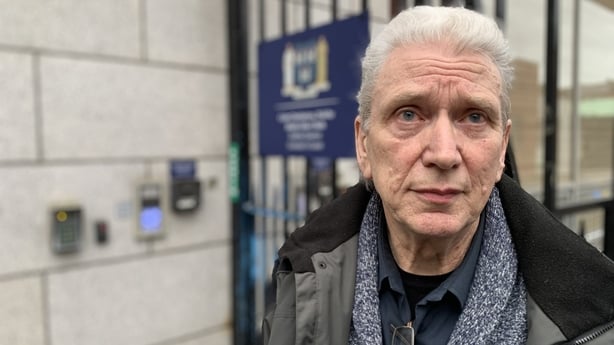A retired senior officer in Dublin Fire Brigade has said the fire that swept through the Stardust nightclub was above normal in terms of temperature and speed in which it spread.
William McQuaid was giving evidence today at the inquests into the deaths of the 48 people who died in the disaster at the Artane club in the early hours of St Valentine's Day 1981.
At the time of the fire William McQuaid was 43-years-old and a 3rd officer based in Tara St station. He had been in the brigade since 1961.
Today, he described the events of 42 years ago as "national tragedy" and a "total catastrophe" for the local community that left a lasting affect.
He told the court that it was an "accelerated fire" and said seeing the ceiling collapsed indicated to him that the temperature of the fire must have been "way above the normal temperature you would get in a normal fire".
He said there was a "terrific temperature in the fire" for the damage it had done.
He said: "The higher the temperature, the quicker it spread.
"It was a fire that was going so fast that it was not a normal speed in terms of what we were used to.
"There was something in the building that contributed to the fast spread of the fire."
Earlier, he recalled how he was at home and off duty when he got a call from a colleague alerting him to the fire who informed him that the Major Action Plan was in operation.
He said that meant "the whole resources of the states were to be used" to deal with it.
When he arrived on the scene he reported to another 3rd officer "who was up to his eyes" organising a "temporary morgue" at the side of the building and contacting the control room to send "as many ambulances as there was in the city and county" to respond, Mr McQuaid said.
He said he saw the brigade in the operation, "there were line of hoses all around the place", and said it appeared that the fire was being fought "effectively and efficiently".
He was tasked with supervising a "systematic search" of the premises, he added
When he entered the building, there were still some pockets of fire around, he said.
He recalled how he found the bodies of two women lying beside each other in the half landing above the main lobby.
"We immediately carried out an inspection to discover signs of life.
"Pulses were felt for. Heartbeats were checked for. Breathing was checked for. There was no response."
He said the women were clothed and agreed that would suggest they were not extensively burned.
Pointing to the windows on the landing, Des Fahy said it appeared that the two women "were extremely close to a means of escape".
Mr McQuaid was also asked today if he felt the training he had received had prepared him for the scale of the Stardust fire.
He said it had and added that "all the year’s of experience we had in fighting fires would be more than sufficient" in knowing what needed to be done.
Stardust inquest hears from ambulance attendant
The inquests also heard today Brian Power, who was an ambulance attendant, now known as a paramedic, employed by the Eastern Health Board.
He was based at St Colmcille's hospital in Loughlinstown at the time.
He told the court how he and his colleague were listening in on the Garda radio frequency and heard about the fire in Stardust. He said the garda traffic they were hearing was becoming more and more animated and urgent.
After informing his own switchboard operator, they then made their way to the scene and arrived at around 2.30am.
He said by the time they arrived, there were no more patients and that the focus then shifted to helping with the deceased.
Mr Power said it was a "burned out building" by the time he got there and described how he brought a body out from the premises.
He recalled how the bodies were being taken to the side of the building and "were just left there in no particular order". He said they felt they needed to be given some dignity, so he they then lined up the bodies and put blankets over them.
Mr Power then told the court that he was tasked with bringing two of the dead to the city morgue in the ambulance. He said they were "not recognisable" and that they were covered with blankets to give them "respect and dignity".
The coroner, Dr Myra Cullinane, informed the jury that the remains were those of Jimmy Buckley and Jacqueline Croker.

Earlier, the inquests heard from Martin Messitt who was a 31-year-old fireman at the time with seven year's experience and based in the North Strand station.
The court heard how he and colleagues were alerted at 1.53am to get to the Stardust.
"We knew it was something serious," he said today. They arrived at 1.58am and by that stage there were other firemen already there.
He described how he made his way in with a hose to the main ballroom via the adjoining function room.
He told the court that he spent around 15 minutes fighting the fire but at the stage it was confined to individual "pockets of fire".
He said there was "little intensity" in the fire then and that the "damage had been done".







